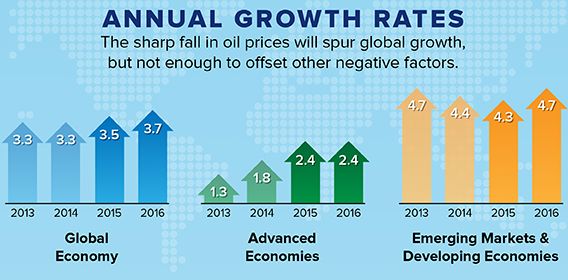Analytics, Economics, EU – Baltic States, GDP, Markets and Companies
International Internet Magazine. Baltic States news & analytics
Friday, 19.04.2024, 15:21
IMF: marginal growth gains in Eastern Europe amid weak external demand
 Print version
Print version
The IMF expects the region to grow 2.9% this year, up from the 2.8% clocked last year, and foresees a solid 3.2% expansion in 2016.
"Lower oil prices and the gradual recovery in the euro area are expected to provide a lift to the region, offsetting the effects of the contraction in Russia," the IMF said in its spring World Economic Outlook report. "External demand remains subdued, and high corporate debt continues to weigh on investment."
The IMF's "emerging and developing Europe" category refers to five European Union members – Bulgaria, Croatia, Hungary, Poland, Romania – plus non-members Serbia and Turkey.
It considers the nearby Czech Republic and eurozone members Estonia, Latvia, Lithuania, Slovakia and Slovenia part of "advanced Europe".
Growth in Central European heavyweight Poland is expected to top the region with 3.5% this year – "supported by domestic demand and improved conditions with trading partners" – and remain steady in 2016.

Poland is followed closely by Turkey, where a strong recovery has it on track to grow by 3.1% in 2015, up from 2.9% last year "as private consumption gets a lift from lower energy prices". The IMF is forecasting 3.6% growth next year for Turkey, where inflation has remained high. Hungary, meanwhile, is forecast to decline to a 2.7% expansion this year and slip further to 2.3% in 2016 due to "lower investment growth and less supportive fiscal conditions".
Both Hungary and Poland have been hit by deflation spurred on by low euro area inflation. A 2.9% expansion is forecast for Romania in 2016, up from 2.7% this year. Growth in the Balkan countries, which were hit by severe flooding last year, is "projected to improve in 2015-16, driven by rebuilding" in Bosnia and Herzegovina and Serbia, and by "employment gains elsewhere". Serbia is expected to remain in recession this year (-0.5%) before rebounding with a 1.5% expansion in 2016. Croatia's economy is forecast to emerge from recession with a 0.5% expansion in 2015 before growing 1.0% next year. The Czech Republic logged a 2.0% expansion last year after emerging from a record-long recession, with the IMF expecting 2.5% growth this year followed by 2.7% in 2016.
"Supporting domestic demand remains a priority, especially in countries with strong links to the euro area," the IMF said.
Slovakia is forecast to expand by 2.9% and 3.3% this year and next.
Growth should remain strong this year in the three Baltic States, all eurozone members. Forecasts call for a 2.8% expansion in Lithuania this year followed by 3.2% in 2016. Latvia is expected to score 3.3% growth next year, up from 2.3 in 2015. Estonia is also forecast to see output hit 3.4% next year, up from a 2.5% forecasted expansion in 2015.








 «The Baltic Course» Is Sold and Stays in Business!
«The Baltic Course» Is Sold and Stays in Business!

